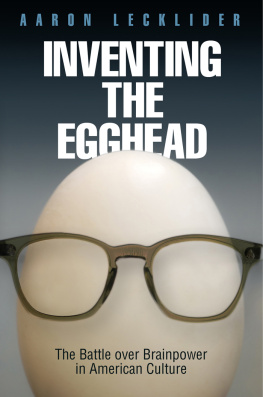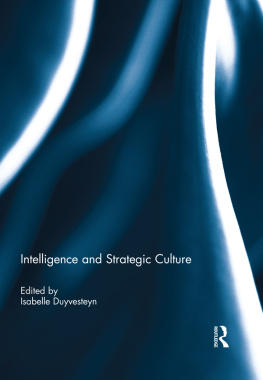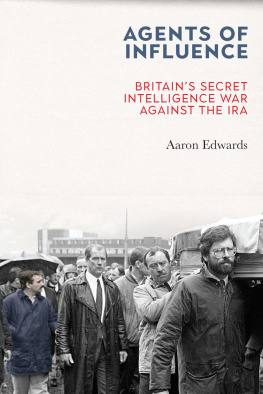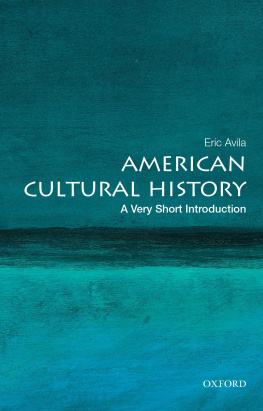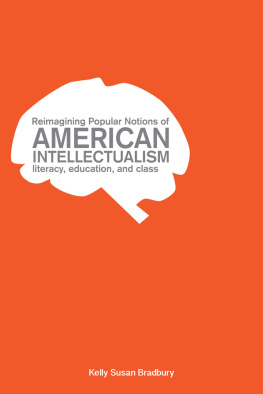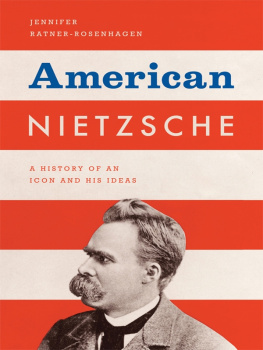Copyright 2013 University of Pennsylvania Press
All rights reserved. Except for brief quotations used for purposes of review or scholarly citation, none of this book may be reproduced in any form by any means without written permission from the publisher.
Published by
University of Pennsylvania Press
Philadelphia, Pennsylvania 19104-4112
www.upenn.edu/pennpress
Printed in the United States of America
on acid-free paper
2 4 6 8 10 9 7 5 3 1
Library of Congress Cataloging-in-Publication Data
Lecklider, Aaron.
Inventing the egghead : the battle over brainpower in American culture / Aaron Lecklider. 1st ed.
p. cm.
Includes bibliographical references and index.
ISBN 978-0-8122-4486-1 (hardcover : alk. paper)
1. United StatesIntellectual life20th century. 2. IntellectualsUnited StatesHistory20th century. 3. Popular cultureUnited StatesHistory20th century. I. Title.
E169.12.L393 2013
306.0973dc23
2012032987
For Evelyn Clark, and for Brian
Introduction: Or, They Think Were Stupid
It is the glory of America that it believes that all that anybody knows everybody should know.
Joseph Cook
George W. Bushs presidential election in 2000 left American liberals dumbstruck. The shame of defeat was one piece of the elections humiliation: that Bush had been awarded the presidency in spite of losing the popular vote was troubling, and the unprecedented role of the Supreme Court in his victory was difficult to reconcile with American ideals of democracy. But it was not simply the fiasco of the election itself that was so unsettling. It was also what the newly elected president represented: wealth, political power, avarice, andperhaps most importantmind-numbing stupidity. Following Democratic contender Al Gores concession, American liberals mourned the defeat of their candidate, but they also loudly bemoaned the death of intelligence in American culture, society, and politics. The presidential campaign ended, effectively, in a tie, but it did speak clearly about the value accorded intellectuals and intellectuality in American culture, complained Todd Gitlin in the Chronicle of Higher Education. What it declared is, to say the least, inauspicious.
The 2000 election transformed the United States into a cultural combat zone of red against blue. The new map divided the country by regionsectional division between North and South experienced a renaissancebut also by degree of cosmopolitanism, lifestyle, taste, and gender. Overwhelmingly, though, the nation appeared to be divided by intelligence. Books began appearing that exposed with humor or with horror the gross incompetence of the new commander-in-chief. Late night television unleashed a torrent of bon mots about dim-witted politicos. A cavalcade of pundits battled over the pros and cons of installing an idiot in the Oval Office. Celebrities attacked the stupid president; politicians assailed vapid celebrities. A short-lived comedy series even made it onto cable television in 2001, coyly titled Thats My Bush!, revolving around one central joke: a fool is elected president of the United States and turns out to be as dumb as a typical sitcom dad. The narrative of victory by incompetents would be repeated in 2004, when a presidential campaign that had been focused largely on issues of combating terrorism and an ongoing war in Iraq was again transformed into a contest over intelligence. That the two candidates for executive office, George W. Bush and John F. Kerry, were both graduates of Yale who had performed at the C-level during their undistinguished undergraduate careers was not important. From their first debate, the election again turned to the apparently contrasting role of intelligenceand sometimes competencein their leadership.
The perceived victory of anti-intellectualism in the Oval Office was by no means new in 2000, even less so in 2004. George H. W. Bush had received similarly disapproving treatment in his grammatically challenged campaigns for president (marred even further by V.P. Dan Quayles persona, epitomized in his unfortunate p-o-t-a-t-o-e mishap). Ronald Reagan was well knowneven respected by somefor his frequent speaking gaffes. Richard Nixons distaste for the establishment and the Elite was the stuff of legend, and his favorite targets were those with useless degrees from highly reputable colleges. In such distinguished company, attacks on George W. Bushs brains appeared as just another volley in a long-standing game of American attack-politics. Mark Crispin Miller declared confidently in his impertinent 2001 compendium of Bush misspeak, The Bush Dyslexicon: Observations on a National Disorder, that anti-intellectual appeal goes way back in American history and is still a potent one; and the Bush team made it with enormous skill, alleging Ws rusticity and hyping Gores aggressive braininess with due unanimity and vehemence.
But this was only one side of the story. On the right, pundits began fighting back against charges of their neoconservative heros anti-intellectual appeal with vigorand their chosen strategy was not to merely affirm the rusticity of their president, as Miller and countless others anticipated. Rather, they retaliated by affirming the soundness of Bushs mental capacities, the fecundity of the Republican intellectual landscape, and the robust intelligence of conservative politics. They also went on the defensive against liberal claims of conservative stupidity, effectively reframing a debate that seemed to be about dismantling intellectual culture into a defense of intelligence. Bush occasionally misspeaks and therefore hes an idiot, complained Ann Right-wing radio host Laura Ingraham railed against representations of the smart liberal/dumb conservative divide:
They think were stupid. They think our patriotism is stupid. They think our churchgoing is stupid. They think our flag-flying is stupid. They think having more than two children is stupid. They think where we liveanywhere but near or in a few major citiesis stupid. They think our SUVs are stupid. They think owning a gun is stupid. They think our abiding belief in the goodness of America and its founding principles is stupid. They think the choices we make at the ballot box are stupid. They think George W. Bush is stupid. And without a doubt, they will think this book is stupid.
Radio personality Michael Savage went even farther in his typically bombastic tirades by defending the intellectual pedigree of the Bush administration. President Bushs formal education includes graduating from Yale and then completing a masters of business administration from Harvards business school, Savage declared. Furthermore, the vice president, Dick Cheney, is also a learned man. He holds both a BA and MA in political science. Secretary of State Colin Powell went to George Washington University where he earned an MBA. Not to mention his collection of distinguished military awards. Condoleezza Rice, who serves as the national security advisor, graduated cum laude from the University of Denver. By contrast, Savage reveled in revealing the lack of distinction in the academic records of those smug anti-Bush haters in Hollywood. Many have no formal college education, Savage seethed. Yet these hollow souls come before the microphones to lecture us over issues that they dont know the first thing about. And were supposed to take them seriously?

